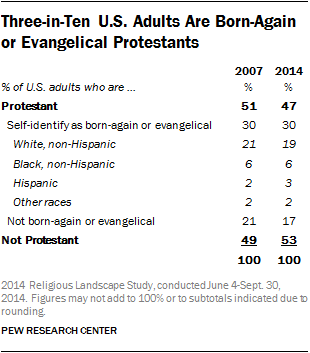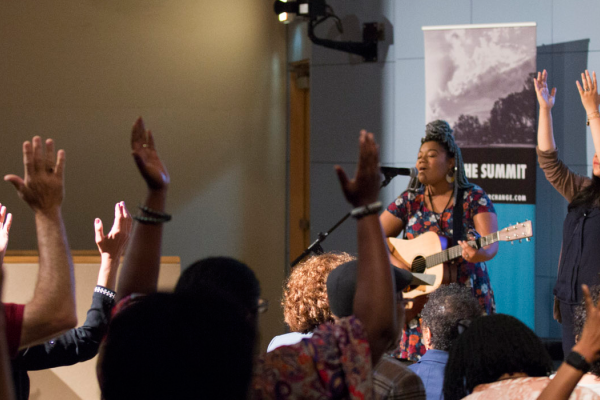“The vast majority of evangelicals support Donald Trump.” We’ve heard that statement so often during this election season that it’s all but assumed fact. But there’s a problem with that line and with how we talk about “evangelicals” in this election.
From a political perspective, “evangelicals” comprise primarily older, politically conservative white men. A statement released today by a racially diverse and intergenerational group of evangelicals bucks that identity. In it, the signatories call out the racism apparent this election cycle, writing, “racism cuts to the core of the gospel, and racial justice and reconciliation is at the heart of the message of Jesus.” They apply that theological commitment to this election by saying that racial bigotry “is a foundational matter of the gospel for us in this election, and not just another issue. … Its brazen use to win elections threatens to reverse real progress on racial equity and set America back.”
The signers are not alone in their belief that racial justice is a core issue for evangelicals, though you wouldn’t know it from reviewing the media’s portrayal of them.
“Evangelical” as a voting bloc has long enjoyed the kind of political sway that has earned it a place at the top of news cycles in every presidential election season in recent history. It stems from the fact that 30 percent of Americans identify as “evangelicals,” according to 2014 data from Pew Research Center, and that partisan political organizing long ago grabbed only two issues to define the term.
The confusion now comes in how we talk about evangelicals. Several polls this election season, including one by Pew, show that Donald Trump’s support among white evangelicals is close to 80 percent; too often that number gets reported as “80 percent of [all] evangelicals support Trump.” But it’s not true.
If you look a little more carefully at the data, about 37 percent of self-identified evangelicals are non-white, and those numbers are growing.
pr_15.05.12_rls_chapter1-08.png

Mitt Romney’s run bears this out: He got a similar level of support from evangelical voters as Trump is getting now, but his support dropped significantly when non-white evangelicals were included in the measurement. And of course, this is a very different election, with one candidate stoking racial fears and making implicit racism explicit.
Data from PRRI shows that the share of older white evangelicals in this country is shrinking, while the non-white and younger generation of evangelicals is growing. Unfortunately, older white evangelicals are showing themselves to be more white than evangelical, putting aside many of their traditional moral concerns to support Donald Trump — a move that seems hypocritical to many. But that trend is not true of evangelicals of color and a younger generation — who define evangelical differently than older white evangelicals do. And thankfully, they are using the original definition Jesus gave us.
“The Spirit of the Lord is upon me,
because he has anointed me
to bring good news to the poor.
He has sent me to proclaim release to the captives
and recovery of sight to the blind,
to let the oppressed go free.”
The root of the Greek verb Jesus uses in Luke 4 for “good news” is evangel, from which we get the words “evangelize” and “evangelical.” It’s a theological term, not a political one. It means that Jesus’ movement was to be based on proclaiming the good news, and without a doubt, Jesus’ gospel was always to be good news for the poor and oppressed.
The new evangelical statement attempts to clarify who evangelicals are and how they should be defined: not as a people beholden to any political party, but as a people who proclaim the good news of Jesus Christ that always seeks to lift up those on the margins of society — not deport them, or scam them, or attack their professionalism because of their ethnicity or gender. These evangelicals are Americans of African and European descent, Latino/a, Asian American, and Native American. They are women and men, as well as younger and older evangelical Christians from a wide range of denominational and political backgrounds.
“We believe in the unity of the body of Christ, but we acknowledge the diverse nature of a community whose faith is biblical and evangelical,” the statement says. “And we are growing. Given the rich diversity within our unity, we call upon the political world to hear all our voices, and for the media to acknowledge that the evangelical community is quite diverse.”
And they’re not alone.
According to Jon Ward — who released a short documentary and an examination of this trend for Yahoo! News today, “It’s unclear how this will play out politically, but a growing and active subset of Christians are determined to reclaim the evangelical label, and to reject the idea that they are a monolithic voting bloc that marches in lockstep with the GOP.”
And even a number of white evangelical leaders, including conservative columnist Michael Gerson, the Southern Baptist Convention’s Russell Moore, and others, have come out against the racial bigotry and misogyny in this election cycle that is antithetical to Christian and evangelical values. Still other white evangelical leaders and pastors have privately told me how “astonishing” it is to them that a majority of white evangelicals seem to be lining up behind Trump.
But this is not ultimately about politics. It’s not about favoring any political party. As the aforementioned statement says: “Whether we support Mr. Trump’s political opponent is not the question here. Hillary Clinton is both supported and distrusted by a variety of Christian voters. We, undersigned evangelicals, simply will not tolerate the racial, religious, and gender bigotry that Donald Trump has consistently and deliberately fueled, no matter how else we choose to vote or not to vote.”
For a new, multiethnic generation of evangelicals, this is a moral test of conscience and faith over what is most important to us.
Will this election ultimately be about “whiteness” or about what is best for the diverse America we are becoming?
Before and after this election, my hope is that the media and other commentators will start getting it right. What it means to be “evangelical” is changing — it’s reverting back to its original meaning.
Older, white “evangelicals” are clearly losing their share of the electorate and their political power, while the share of younger, non-white evangelicals is growing. The issues that motivate these younger, multiethnic evangelicals — which include racial, economic, and gender justice and healing, as well as issues of life from womb to tomb — remind us what it means to be a bearer of good news to those on the margins. That points to a very different future for the word “evangelical” in this country. And that is “good news” indeed!
Got something to say about what you're reading? We value your feedback!

